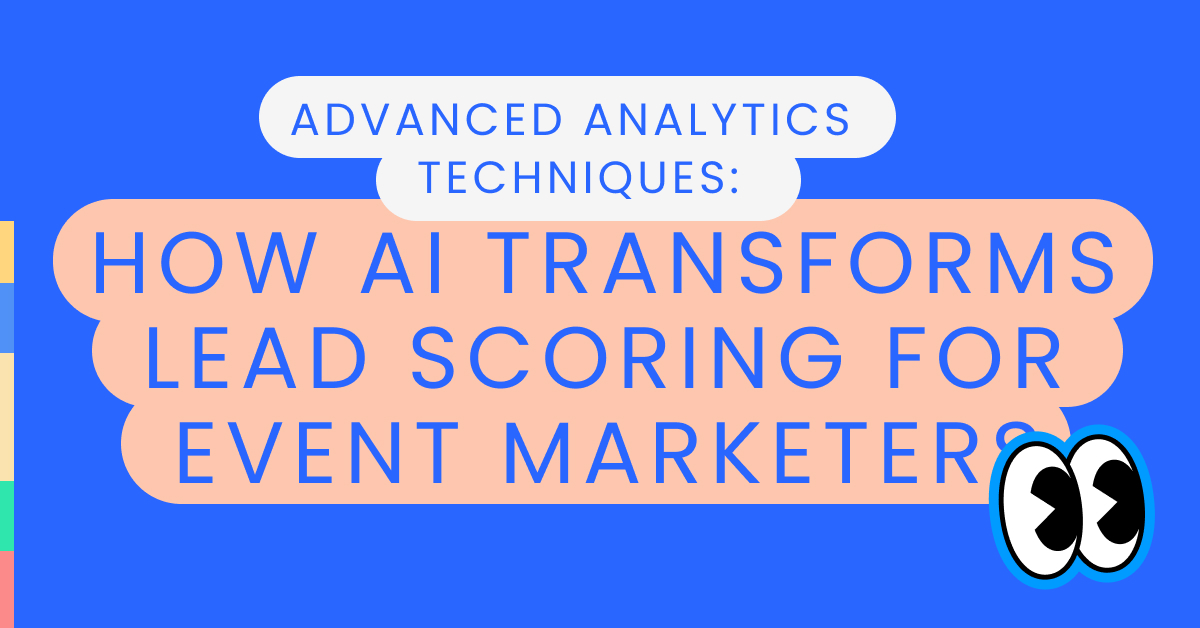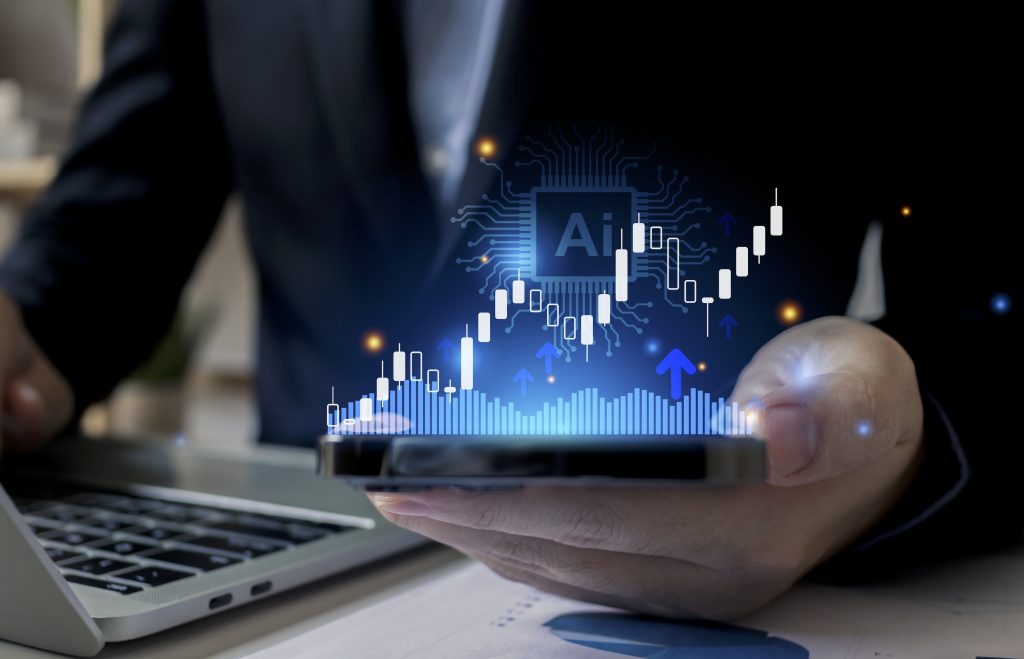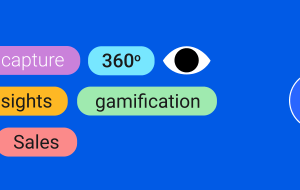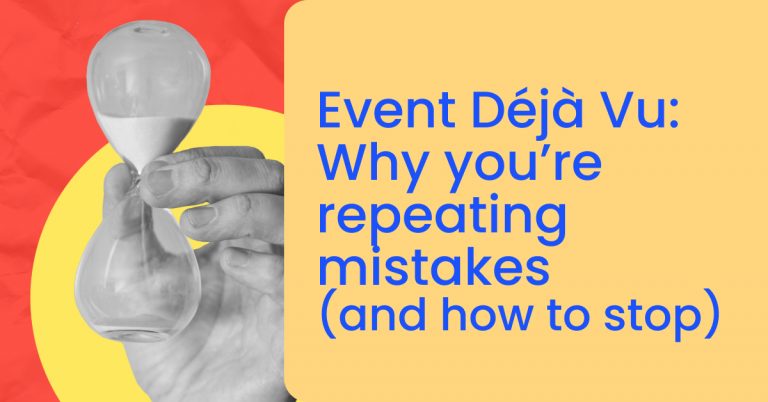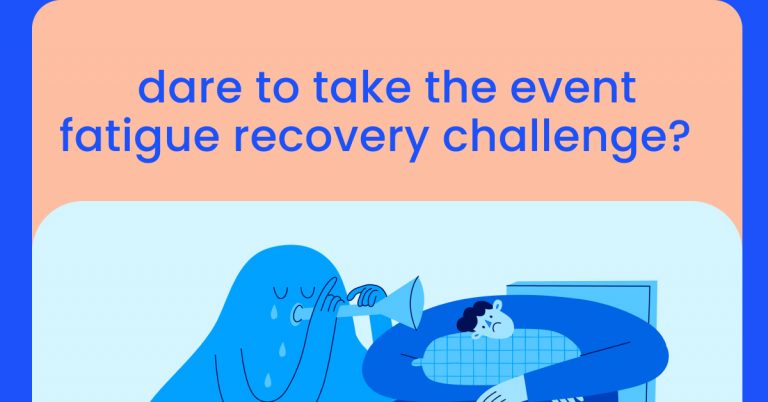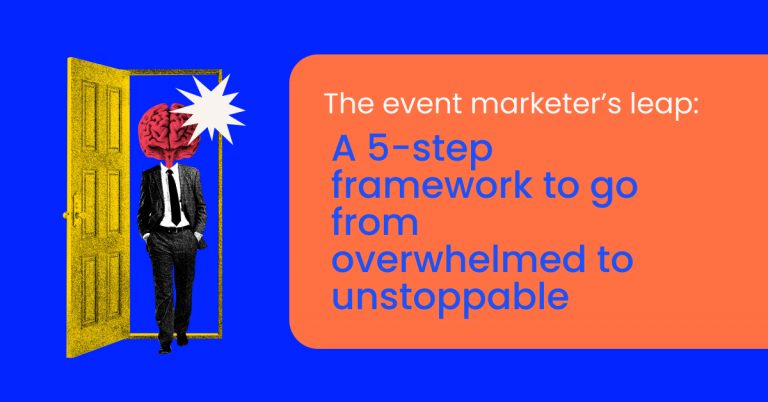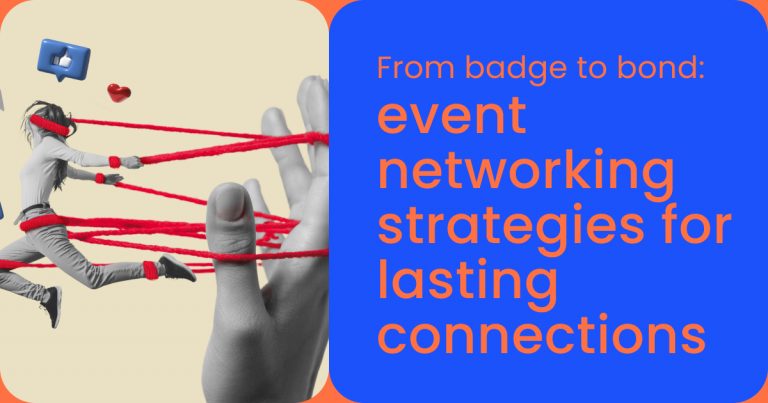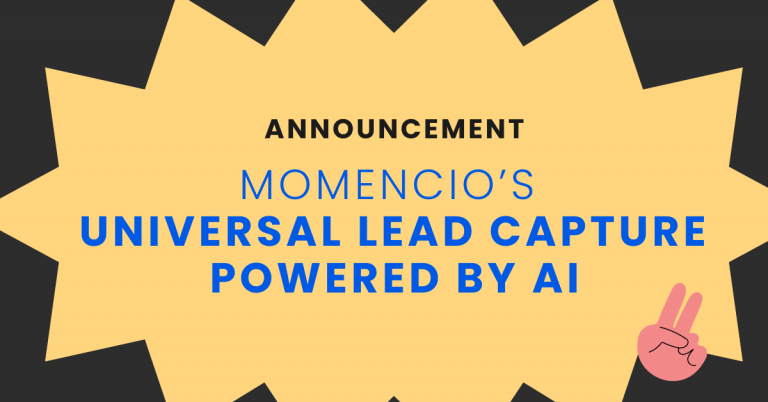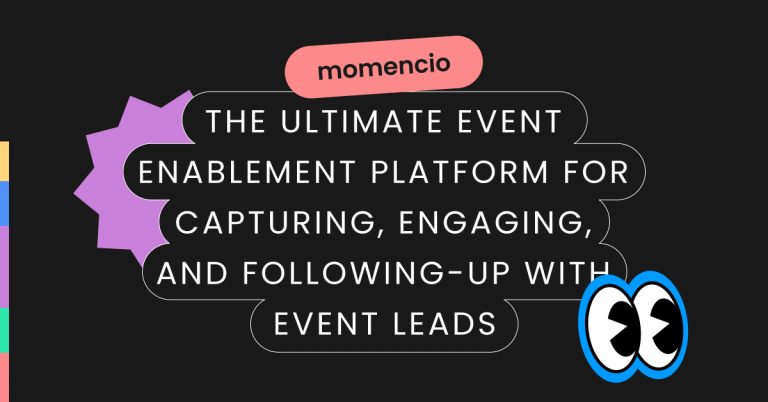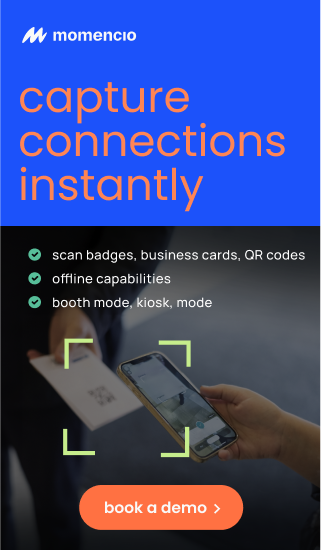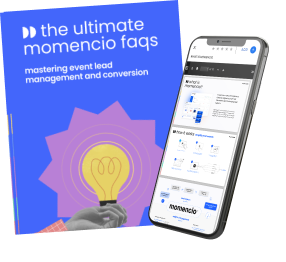Understanding and engaging with attendees effectively is crucial for success. Lead scoring, a pivotal aspect of this process, traditionally relies on manual data analysis and instinct. However, with the advent of artificial intelligence (AI), the capability to assess and prioritize event leads has undergone a transformative upgrade. AI-driven advanced analytics techniques are now enabling marketers to execute precise lead scoring with greater efficiency and accuracy than ever before.
AI not only promises enhanced accuracy in lead scoring but also introduces a new dimension of predictive capabilities, enabling marketers to forecast attendee interests and behavior. This proactive approach ensures that event interactions are not only productive but also personalized, aligning perfectly with the evolving expectations of today’s event attendees.
By harnessing the power of advanced analytics techniques, event marketers can unlock unprecedented levels of insight and efficiency, transforming the traditional event planning paradigm into a dynamic, AI-enhanced strategy.
Main Question Answered: How is artificial intelligence transforming lead scoring and enhancing event marketing strategies?
For a comprehensive look at momencio’s lead scoring capabilities, explore our detailed article on advanced lead scoring mechanisms: how momencio prioritizes and enhances lead engagement.
Understanding Advanced Analytics and AI
Advanced Analytics: A Gateway to Enhanced Decision-Making
Advanced analytics represents a profound evolution in data analysis, going beyond traditional methods to include predictive models, machine learning algorithms, and sophisticated data mining techniques. In the context of event marketing, these analytics methods process large volumes of data from diverse sources — registration details, attendee behavior, social media interactions, and more — to unearth patterns that are not immediately apparent.
The true power of advanced analytics lies in its capability to predict future trends and behaviors, offering marketers foresight into potential outcomes. For instance, by analyzing historical data, advanced analytics can predict which event themes or topics are likely to draw more interest, guiding marketers in tailoring their event content to maximize engagement and attendance.
Artificial Intelligence: The Engine Behind Smart Analytics
Artificial intelligence takes advanced analytics a step further by incorporating learning and decision-making capabilities that mimic human thought processes. AI in event marketing can take the form of chatbots that provide real-time assistance to attendees, recommendation systems that suggest sessions based on an attendee’s interests, or dynamic pricing models that adjust ticket prices in real time based on demand and other factors.
AI systems continuously learn from new data, improving their accuracy and effectiveness over time. This aspect is crucial in dynamic environments like events where attendee preferences and behaviors can change rapidly. AI’s ability to adapt and respond to these changes in real time makes it an indispensable tool for event marketers.
Enhancing Lead Scoring with AI
Lead scoring, the process of assigning value to each lead based on their likelihood to convert, is particularly well-suited to AI enhancements. Traditional lead scoring might use static criteria and past interactions to rank leads, but AI introduces a dynamic component. It analyzes how leads interact with event content, gauging their engagement levels through metrics like session attendance duration, participation in polls and surveys, and interactions on the event app.
By integrating AI, lead scoring transforms from a manual, somewhat subjective process into a precise, data-driven strategy. AI algorithms can identify patterns that indicate strong prospects, such as specific actions taken during an event that correlates with higher conversion rates. These insights allow marketers to prioritize follow-ups more effectively and tailor their approaches to individual needs, significantly increasing the chances of converting leads into customers.
Practical Applications of AI in Event Analytics
- Predictive Attendee Insights: AI can forecast attendee interests and preferences, helping planners design more relevant and engaging event experiences.
- Real-time Adaptations: During an event, AI can suggest schedule adjustments or content delivery changes based on live feedback and engagement metrics, ensuring the event resonates well with the audience.
- Enhanced Personalization: By understanding individual behaviors and preferences, AI can help customize the event experience for each attendee, from personalized schedules to tailored content recommendations.
Check out The power of lead scoring in managing multi-channel event marketing efforts
The integration of advanced analytics and AI into event marketing does not just streamline operations; it redefines them. These technologies enable a level of attendee insight previously unattainable, turning every interaction into a data point and every data point into a strategic opportunity.
AI-Driven Techniques in Lead Scoring
The Role of AI in Enhancing Lead Scoring
In the evolving landscape of event marketing, the adoption of AI-driven techniques in lead scoring is not just innovative; it’s becoming essential. AI enhances lead scoring by automating the evaluation of potential leads based on their interactions and behaviors during events. This section explores various AI technologies that support this process and the specific benefits they bring to event marketers.
Technologies Powering AI-Driven Lead Scoring
- Machine Learning (ML): At the heart of AI-driven lead scoring are machine learning algorithms that analyze historical data to identify patterns and predict future behaviors. ML models can assess the likelihood of a lead converting based on their engagement levels, such as session attendance, interaction with kiosks, and participation in discussions.
- Natural Language Processing (NLP): AI utilizes NLP to analyze text from chat interactions, feedback forms, and social media posts to gauge sentiment and interest levels. This analysis helps score leads based on their engagement and enthusiasm, providing a nuanced understanding of their potential.
- Neural Networks: More complex AI models, like neural networks, can process vast amounts of data from various sources to create a comprehensive profile of each attendee. These profiles help score leads by synthesizing data points like demographic information, professional background, and personal interests related to their event activities.
Benefits of AI-Driven Lead Scoring for Event Marketers
- Increased Accuracy: AI algorithms reduce human error and bias in scoring leads. They provide a more objective assessment based on concrete data, ensuring that the most promising leads are prioritized.
- Scalability: AI can handle the scoring of thousands of leads simultaneously, a task that would be overwhelming for human teams. This scalability is particularly beneficial in large-scale events where thousands of interactions must be analyzed.
- Real-Time Processing: AI systems can score leads in real-time, allowing event marketers to act quickly, engaging potential high-value attendees with personalized messages or offers during the event itself.
- Dynamic Adaptation: AI models continuously learn from new data. As they are exposed to more events and interactions, they become better at predicting which leads are most likely to convert, and their scoring adjusts accordingly.
Implementing AI in Your Lead Scoring Strategy
- Integration with Existing Systems: For effective AI-driven lead scoring, it’s crucial to integrate AI tools with existing CRM systems and event management platforms. This integration ensures that data flows seamlessly across systems, enabling real-time updates and interactions.
- Training and Calibration: AI models require training on historical event data to understand what good leads look like. This process might involve calibration with human oversight to refine the models based on specific event goals and lead characteristics.
- Ethical Considerations: When implementing AI, it’s crucial to consider privacy and ethical issues related to data use. Event marketers should ensure that they comply with regulations such as GDPR and are transparent with attendees about how their data is used.
- Continuous Learning and Improvement: AI systems should not be set and forgotten. Constant monitoring and tweaking are necessary to adjust to new trends and changes in attendee behavior or event dynamics.
By leveraging these AI-driven techniques, event marketers can transform their approach to lead scoring, making it not only more efficient but also more effective. This strategic enhancement allows for deeper engagement and personalization, which are crucial to converting leads into loyal customers.
Case Studies: AI Transforming Events
Harnessing AI for Enhanced Event Outcomes
The practical application of AI in event marketing isn’t just theoretical; numerous organizations have successfully integrated these technologies to revolutionize their events. This section explores several case studies that illustrate the transformative impact of AI on event lead scoring and overall marketing strategies.
Case Study 1: Tech Industry Conference
Background: A significant tech conference known for attracting thousands of attendees implemented an AI-driven lead-scoring system to enhance engagement and maximize ROI from its annual gathering.
Implementation:
- AI-Driven Attendee Tracking: The event utilized wearable technology integrated with AI to track attendee movements and session attendance, providing real-time data on engagement.
- Real-Time Lead Scoring: Machine learning algorithms analyzed the data to score leads based on engagement metrics like session duration, participation in interactive polls, and network interactions.
Outcome:
- The AI system identified highly engaged attendees in real time, allowing the marketing team to follow up with them personally during the event.
- Post-event analysis showed a 30% increase in lead conversion rates compared to previous years, directly attributable to AI-enhanced lead scoring.
Case Study 2: International Medical Symposium
Background: An international medical symposium sought to improve engagement and follow-up with thousands of global attendees, focusing on tailored content and interactions.
Implementation:
- NLP for Feedback Analysis: AI was used to analyze feedback from previous events to identify critical topics and sessions that generated the most interest and engagement.
- Personalized Recommendations: AI algorithms processed attendee profiles to offer personalized session recommendations and facilitated networking opportunities based on professional interests.
Outcome:
- Attendee satisfaction ratings improved by 25%, with personalized recommendations cited as a major factor.
- The symposium reported a higher quality of discussions and network connections, leading to increased professional collaborations post-event.
Case Study 3: Virtual Real Estate Expo
Background: Transitioning from a traditional in-person format to a virtual platform, a large real estate expo utilized AI to replicate the personal interaction dynamics of physical events online.
Implementation:
- Virtual Engagement Tools: AI-powered chatbots were deployed to provide instant assistance and information, mimicking the concierge services typically available at in-person events.
- Behavioral Analytics for Lead Scoring: AI analyzed online behaviors, including virtual booth visits and webinar participation, to score leads dynamically.
Outcome:
- The expo maintained a high level of engagement, with the AI chatbots handling over 50,000 interactions throughout the event.
- Lead nurturing became more targeted, resulting in a 20% increase in follow-up effectiveness, as scored leads received more relevant information and connections.
Lessons Learned and Best Practices
From these case studies, several best practices emerge for integrating AI into event marketing:
- Start with Clear Objectives: Clearly define what you aim to achieve with AI, whether it’s increasing engagement, enhancing personalization, or improving lead quality.
- Ensure Data Quality: AI’s effectiveness is directly tied to the quality of data it processes. Ensure accurate data collection at every stage of the event.
- Focus on Attendee Experience: Use AI to enhance, not replace, human interactions. The goal should be to augment the attendee experience, making it more personalized and responsive.
- Evaluate and Iterate: Post-event analysis is crucial. Evaluate the performance of AI tools and make necessary adjustments for future events.
These case studies demonstrate the practical benefits of AI in transforming event lead scoring and engagement strategies. By adopting similar AI-driven approaches, event marketers can significantly enhance their event outcomes, making every attendee interaction more meaningful and productive.
Integrating AI with Event Marketing Strategies
Effective AI Integration for Maximizing Event Impact
The integration of AI into event marketing strategies represents a significant leap forward in how events are planned, executed, and analyzed. This section outlines practical steps and considerations for seamlessly incorporating AI technologies into event marketing efforts, ensuring that events are not only more engaging but also yield better data for lead scoring and follow-up actions.
Strategic Planning for AI Implementation
Assessing Needs and Goals: Before integrating AI, it’s crucial to identify specific areas within event planning and execution where AI can add the most value. This might include automating lead capture, personalizing attendee experiences, or enhancing real-time decision-making based on attendee data.
Choosing the Right AI Tools: Select AI tools that align with your specific needs. Consider tools for:
- Automated Lead Scoring: Utilize AI systems that analyze engagement and interaction data to score leads in real time.
- Personalized Content Delivery: Implement AI-driven recommendation systems to provide attendees with personalized session suggestions and materials.
- Interactive Attendee Engagement: Explore AI chatbots and virtual assistants to interact with attendees, answer their questions, and guide them through the event.
Integration with Existing Platforms: Ensure that AI tools integrate smoothly with existing event management software and CRM systems. Seamless integration allows for the automatic flow of data across systems, enhancing the accuracy of lead scoring and the efficiency of follow-up processes.
Implementing AI During Events
Real-Time Data Utilization: Leverage AI to make real-time adjustments during the event based on live data insights. AI can help identify which sessions are performing well and which might need more promotion to boost attendance.
Enhanced Engagement through AI: Utilize AI to create more engaging and interactive experiences for attendees. Examples include:
- AI-Powered Networking Solutions: Help attendees connect based on mutual interests or professional alignment.
- Gamification: Incorporate AI-driven games or challenges that encourage participation and enhance the learning experience.
Post-Event AI Utilization
Data-Driven Insights for Follow-Up: Use AI to analyze event data post-event to identify successful elements and areas for improvement. AI can also help prioritize leads for follow-up based on their engagement levels and predicted interest in products or services.
Automated Follow-Up Campaigns: Deploy AI-driven marketing automation tools to send personalized follow-ups to attendees, ensuring that messages are tailored based on their activities and interests shown during the event.
Long-Term Relationship Building: AI can help maintain the momentum post-event by suggesting timely touchpoints and providing insights into the best ways to nurture relationships with leads over time.
Best Practices for AI Integration in Event Marketing
- Continuous Training and Learning: Regularly update and train your AI systems with new data to improve their accuracy and effectiveness. The more data AI has, the better it can learn and adapt to changing attendee behaviors.
- Ethical Considerations and Privacy Compliance: Always prioritize attendee privacy and comply with all relevant data protection regulations. Be transparent with attendees about how their data will be used and the benefits they can expect.
- Collaboration Between Teams: Ensure that marketing, sales, and IT teams work closely together in the implementation and ongoing management of AI tools. This collaboration ensures that AI integration meets the needs across all stages of the event lifecycle.
By following these guidelines and strategically integrating AI into event marketing strategies, organizations can enhance the attendee experience, improve lead scoring accuracy, and ultimately drive better event ROI.
Future of AI in Event Marketing
Exploring Emerging Trends and Innovations
The future of AI in event marketing is vibrant and promises even more integration and intelligent features that will continue to transform how events are conceptualized, delivered, and analyzed. This section will delve into the emerging trends and predict how AI will further influence the event marketing landscape.
Advancements in AI Technologies
- Predictive Analytics and Machine Learning Enhancements:
- Future AI tools will offer even more sophisticated predictive analytics capabilities, allowing marketers to forecast event success factors more accurately and tailor events to predicted attendee preferences.
- Enhancements in machine learning algorithms will enable a deeper understanding of attendee behavior patterns, facilitating more precise lead scoring and personalized engagement strategies.
- Augmented and Virtual Reality:
- The integration of AI with augmented reality (AR) and virtual reality (VR) technologies will provide immersive event experiences that can engage remote attendees as if they were physically present.
- These technologies will allow for real-time attendee reactions and interactions to be captured and analyzed by AI, enhancing lead qualification and engagement metrics.
- Enhanced Natural Language Processing:
- Future developments in NLP will improve the sophistication of chatbots and virtual assistants, enabling them to handle complex interactions and provide more valuable assistance to attendees.
- AI-driven NLP will also play a crucial role in analyzing open-ended feedback from attendees, providing richer insights into their experiences and expectations.
Personalization at Scale
AI will continue to refine event marketers’ capabilities to offer hyper-personalized experiences to attendees. Machine learning algorithms will get better at segmenting audiences based on micro-behaviors and demographic details, allowing marketers to craft highly targeted content and experiences that meet the unique preferences of each attendee segment.
Seamless Integration Across Platforms
As AI technology evolves, its integration with event management platforms and CRM systems will become more seamless. This integration will enable a unified view of attendee data across all stages of the event lifecycle, from pre-event engagement to post-event follow-up, improving the efficiency and effectiveness of event strategies.
AI in Event Sustainability
Looking forward, AI will also play a pivotal role in making events more sustainable. By analyzing data on resource utilization and attendee behaviors, AI can help planners implement more eco-friendly practices, such as optimizing resource allocation and reducing waste.
Embracing AI for Competitive Advantage in Event Marketing
As we’ve explored throughout this article, AI’s role in event marketing is transformative, providing unprecedented capabilities for personalization, engagement, and efficiency. AI not only streamlines operations but also enhances the human aspects of event management by offering more profound insights into attendee behaviors and preferences. This concluding section summarizes the key takeaways from our discussion and underscores the strategic advantage AI provides in the competitive landscape of event marketing.
Key Takeaways
- Enhanced Lead Scoring: AI-driven analytics allow for more accurate and dynamic lead scoring based on real-time data, significantly improving the quality of leads passed to sales teams and increasing the potential for conversions.
- Personalized Attendee Experiences: Through predictive analytics and machine learning, AI enables marketers to offer highly personalized event experiences that meet individual attendee needs and preferences, thereby increasing engagement and satisfaction.
- Operational Efficiency: AI automates many of the labor-intensive tasks associated with event planning and execution, from registration and scheduling to feedback collection and post-event analysis. This automation frees up human resources to focus on more strategic and creative aspects of event management.
- Data-Driven Decision Making: With AI, event marketers can make informed decisions based on comprehensive analytics that reveal what works and what doesn’t, allowing for continuous improvement in event strategies.
- Future-Proofing Events: AI’s capability to adapt and learn from new data means that event strategies can continually evolve in response to changing attendee expectations and emerging marketing trends, ensuring that events remain relevant and impactful.
Encouragement for Future Engagement
To truly capitalize on AI’s benefits in event marketing, professionals in the field must stay abreast of technological advancements and continually assess and integrate new AI tools and applications. Investing in AI technology is not merely about keeping up with trends but about making a strategic decision to enhance the quality and impact of event marketing efforts.
Event marketers should consider the following steps to integrate AI successfully:
- Continuous Learning and Development: Stay educated on new AI developments and understand how they can be applied to enhance event marketing strategies.
- Collaborative Implementation: Work closely with technology providers and internal IT teams to ensure that AI tools are implemented effectively and aligned with overall business goals.
- Ethical Considerations: Always prioritize attendee privacy and ensure compliance with data protection regulations. Be transparent about AI use and its benefits to build trust with attendees.
Take the Next Steps with AI in Event Marketing
For Event Marketers Ready to Innovate:
Assess Your Current Tools: Review your existing event marketing tools and strategies to identify areas where AI can make the most significant impact. Whether it’s through enhancing lead scoring, personalizing attendee experiences, or streamlining operations, understanding your current gaps is the first step toward transformation.
Partner with AI Experts: Collaborate with AI technology providers who specialize in event marketing solutions. Companies like momencio offer tailored AI tools that can integrate seamlessly with your existing systems, providing you with sophisticated analytics and automation capabilities.
Invest in Training: Equip your team with the knowledge and skills needed to leverage AI effectively. Consider training sessions or workshops focused on AI applications in event marketing, which can help demystify the technology and illustrate its practical benefits.
For Decision-Makers Considering AI Investments:
Calculate the Potential ROI: Use the insights and statistics from case studies and industry reports to model the potential return on investment from integrating AI into your event strategies. Highlighting the expected gains in efficiency, lead quality, and attendee satisfaction can help justify the initial expenditure.
Explore Scalable AI Solutions: Start small with scalable AI solutions that don’t require extensive upfront investment. Many AI platforms offer modular functionalities that can grow with your needs, allowing you to expand your AI capabilities as you witness the benefits gradually.
Monitor Industry Trends: Stay informed about the latest advancements in AI and event marketing by subscribing to industry newsletters, attending relevant webinars, and participating in professional forums. This ongoing education will help you keep your strategies fresh and competitive.
Whether you’re just starting to explore AI applications or seeking to expand your existing AI capabilities, engaging with expert consultants or AI solution providers can help you navigate this complex landscape. Consider reaching out to apps like momencio, which offers specialized AI tools tailored for event marketing, to discover how you can transform your event experiences and lead management processes. Book a demo!
In conclusion, the integration of AI in event marketing is not just a technological upgrade but a strategic imperative for any business looking to thrive in a digital-first world.
If you want to know more about momencio and what it does, we answer all the important questions in a free ebook. Download it here
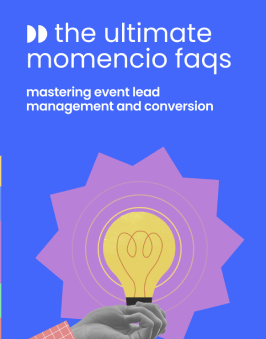
FAQs: Navigating AI in Event Marketing
As we wrap up our discussion on the transformative impact of AI in event marketing, let’s address some frequently asked questions that can help clarify common concerns and provide deeper insights into the effective use of AI technologies in this field.
- What are the first steps to integrating AI into my event marketing strategy?
- Start by identifying specific challenges within your event marketing that AI could address, such as data analysis, lead scoring, or attendee engagement. Evaluate different AI solutions and vendors who offer integrations with your existing event management software and CRM systems. It’s also essential to train your team on the basics of AI and its applications in event marketing to ensure smooth implementation and adoption.
- How can I measure the ROI of implementing AI in my event marketing efforts?
- Measure the ROI of AI by comparing event outcomes before and after AI integration. Key metrics to consider include attendee engagement levels, lead conversion rates, and the efficiency of event operations. Additionally, track the reduction in manual tasks and how quickly your team can act on insights generated by AI, as these can significantly impact overall event success and cost savings.
- Are there privacy concerns with using AI in event marketing?
- Yes, privacy is a major concern, especially when dealing with large amounts of personal data. Ensure compliance with data protection laws such as GDPR or CCPA, depending on your location. Be transparent with attendees about how their data is being used and secure consent where necessary. Implementing robust cybersecurity measures to protect stored data is also crucial.
- Can AI replace the need for human interaction in event marketing?
- AI is not intended to replace human interaction but to enhance it. AI can handle repetitive and data-intensive tasks, allowing the human team to focus on more strategic and creative aspects of event marketing. The goal is to use AI to improve the efficiency and effectiveness of human efforts, not to eliminate them.
- What future trends should I be aware of regarding AI in event marketing?
- Keep an eye on developments in predictive analytics, machine learning advancements, and the integration of AI with other emerging technologies like augmented and virtual reality. Also, watch for new regulations regarding data privacy and AI ethics. Staying ahead of these trends will help you adapt and innovate in your event marketing strategies.
- How can small to mid-size enterprises (SMEs) leverage AI without significant investment?
- SMEs can start by using off-the-shelf AI tools provided by many event management and marketing platforms, which are often cost-effective and don’t require significant upfront investments. These tools can automate tasks such as attendee queries via chatbots, personalized content recommendations, and essential lead scoring. Over time, as the business grows, more customized AI solutions can be integrated.
Interesting Facts from Research
- AI Engagement: Events using AI-driven engagement tools have seen a 40% increase in attendee satisfaction scores.
- Lead Conversion: AI-enhanced lead scoring systems report up to a 50% increase in lead conversion rates compared to traditional methods.
- Adoption Rates: The adoption of AI in event marketing has grown by over 200% in the past two years, signaling a significant shift towards technology-driven event strategies.
Useful Links:
- AI Impact on Marketing – An article from Forbes discussing the transformative impact of AI on marketing.
